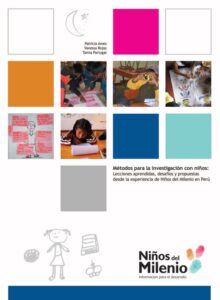Métodos para la investigación con niños: lecciones aprendidas, desafíos y propuestas desde la experiencia de Niños del Milenio en Perú
| Year | : | 2010 |
|---|---|---|
| Author/s | : | Patricia Ames, Vanessa Rojas, Tamia Portugal |
| Area/s | : | Ethnicity, gender and citizenship |
Ames, P., Rojas Arangoitia, V. y Portugal, T. (2010). Métodos para la investigación con niños: lecciones aprendidas, desafíos y propuestas desde la experiencia de Niños del Milenio en Perú. Lima: GRADE. Niños del Milenio.
It is an important contribution to qualitative research on children in Peru for several reasons. The first is that while respecting the inductive nature of qualitative research, the book clearly shows how previous research is taken into account, mainly in terms of the conception of children as the focus of academic interest. Building on previous studies goes against the grain of some local practices that seem to want to develop novel knowledge in a vacuum, out of nothing. This book, on the other hand, presents international and national theoretical conceptions that underpin the choice of research methods. This is key if one considers that any study must be inscribed in relation to previous research references, to which one can finally contribute or with which one can disagree. The second is that the book shows how data collection in qualitative research can and should be systematic. This is not the case in some studies that present what could be described as anecdotal accounts of personal experiences, lacking any form of planning. This basically prevents others from using the same methods. The present study describes how it is possible to have a prior method, which can certainly be adjusted in the field according to partial results and reference theories.







